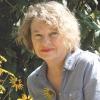Since she retired six years ago, 91-year-old Sr. Maura Brannick has certainly had more time to reflect on her ministry as a Holy Cross sister and as a nurse. She stays connected to the award-winning medical clinic for the poor and uninsured that she founded in 1986 in South Bend, Indiana. On many Mondays, she still catches a ride downtown to Western and Chapin Streets to visit with the largely volunteer staff and write thank you notes to clinic donors.
But, there’s still a lot about the amazing development of the clinic that mystifies her.
“I had no idea that it would ever be so large,” she said, shaking her head in disbelief. Brannick knows that more than 60 licensed physicians from the local community now regularly volunteer their services. Also giving their time and professional services are nurses, optometrists, ophthalmologists, counselors, social workers. A pre-med student from the University of Notre Dame is annually awarded the Thomas A. Dooley III Internship. The student intern shadows volunteer physicians to learn about caring for an indigent patient population.
Brannick said that a Scripture passage from Micah has inspired her for many years. The prophet Micah told the people of Israel that they knew what God wanted from them. The message is the same for each of us, she said. We are: “To do justice and to love goodness, and to walk humbly with your God.” (Mi 6:8).
Brannick maintains that even though it’s clear that God wants us to reach out in justice and love, the work is not easy. “It’s very emotionally draining to work with the poor,” she explained. “When you help one, there are a lot people in line waiting right behind this one with the same problem.” She believes that most Americans who have what they need have no idea what life is like for those who don’t.
“One of our volunteers,” she continued, “was a lady from a wealthier part of town who volunteered as a receptionist. One day as one of our patients was leaving the clinic, she stopped at the receptionist desk to ask for toilet paper. The volunteer was shocked – She had no idea that people would be without toilet paper. She went out and bought 500 rolls of toilet paper to bring back to give to people.” Clinic volunteers soon realized that food stamps don’t cover non-food items like paper towels, toilet paper, laundry detergent, hygiene items.
“We get lots of donations at Christmas,” Brannick said. “But, many people need hundreds of things that the rest of us take for granted – and not just at Christmas time.”
Related - Committed to care
